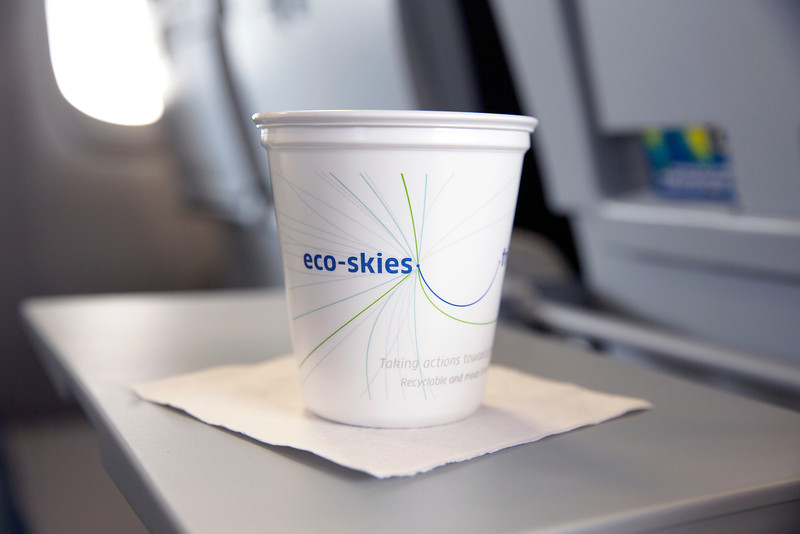I suppose it should come as no big surprise, but airlines generate a lot more waste than I ever imagined.
According to a Guardian report—
Airline passengers generated 5.2m tonnes of waste in 2016, most of which went to landfill or incineration, the International Air Transport Association (IATA) estimates. That’s the weight of about 2.6m cars. And it’s a figure set to double over the next 15 years.
2.6MN cars per year of waste?!
The figure above does include toilet waste, but still…
Where does it all come from? Think about it — the plastic or foil containers in which meals come in, plastic utensils, wrappings for pillows and blankets, newspapers and other items left onboard, and of course all the leftover food. One United FA told me that it is a “crime” how much food is wasted on an eastbound transatlantic flight since so many passengers just sleep.
And it’s not like that food can be donated to charity upon arrival in Europe. Strict European Union animal health legislation labels catering waste arriving from beyond EU borders “high-risk”. That means perfectly good food must be burned or buried.
How Iberia Plans to Reduce Waste by 80%
Iberia plans to reduce waste by 80% by 2020 through several initiatives. First, it is mandating FAs separate waste and providing special cabin trolleys to make this easier. Second, it is exploring “low-packaging meals and reusable cutlery”. Third, it wants to use technology to cut down on loading too much food. For example, by tracking passenger meal preference by frequent flyer number, it hopes to better anticipate onboard consumption and thereby eliminate waste.
United EcoSkies
United’s EcoSkies program aims to reduce landfill waste by 27 tons. United FAs also sort trash and the carrier has introduced new compostable paper cups:

Remember our discussion about unused amenity kits earlier this week? The Guardian reports that United is also cutting waste by donating unused amenity kits to charity.
CONCLUSION: It Makes Financial Sense Too
This isn’t just an issue of saving the environment, it is one of saving money. Managing this waste cost airlines roughly $5BN last year. Perhaps this is where all parties can come together. Airlines further the dual goal of increasing profit and cleaning the environment by reducing waste. I think we can all agree that is a worthy goal to pursue.




Not like the US CBP would be all fine and happy about letting food (or booze, a rose in an LH F cabin) from a flight from the EU go anywhere but the dump.
I thought this was some kind of April Fools article where you’d suggest some outrageous/funny plan to use waste to power the aircraft or something like that.
i am a dumpster diver…on the ground…and you will not believe this but it is true :
i have spend precisely $0 on food for the past 2 years and 3 months.
and, i am eating spinach and kale salads, dark chocolate with almonds, raisin bran with organic skim milk, chobani yogurt, every variety of apple you can imagine, hummus, pistachios, granola bars galore, etc etc.
the waste in the sky is crazy. because they shove a plate upon you with things that you did not choose to eat. if we could somehow figure out how to reposition this food…….
Just be careful. I had two friends who died doing this (they bin-hopped something bad at a grocery store…).
thanks. yeah, i’m uber-careful.
your two buddies that died…man, sorry. did they die from something they ATE…OR…from falling or “hopping” into a bin and an injury from such??
???????
What the H is the abbreviation MN? Million is commonly abbreviated as M or MM. But never MN…
And billion is B, not BN.